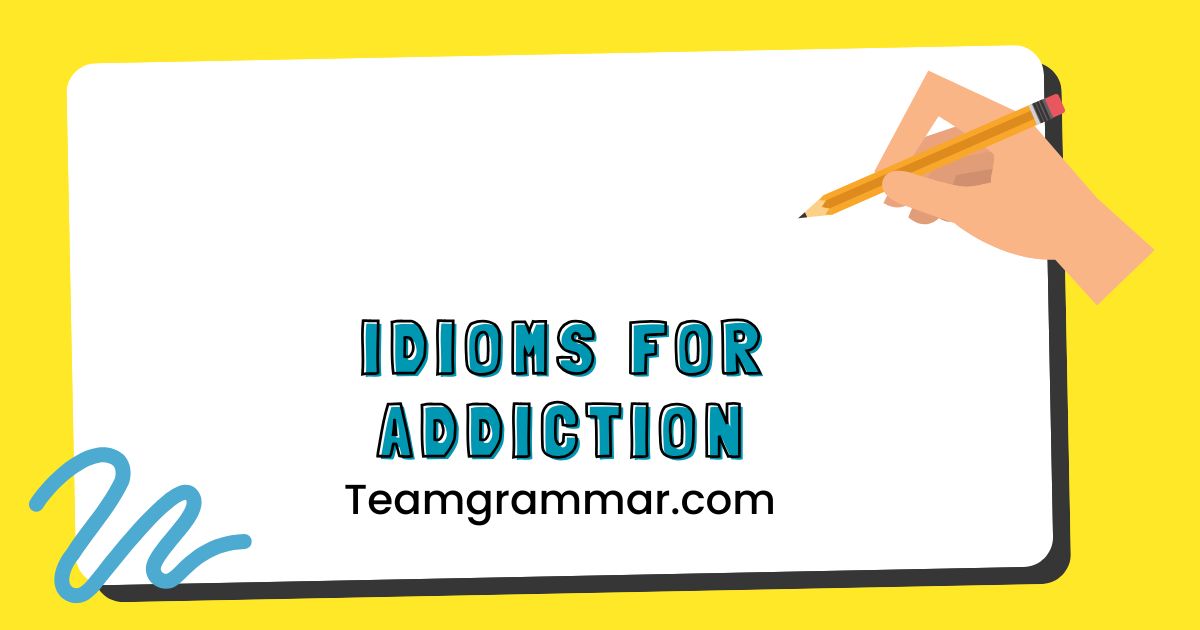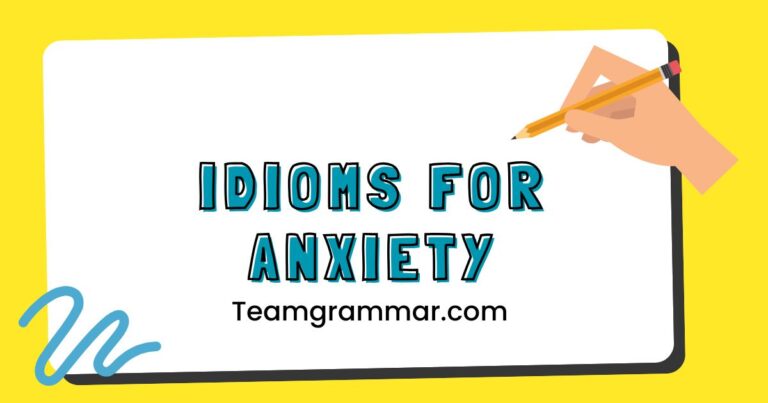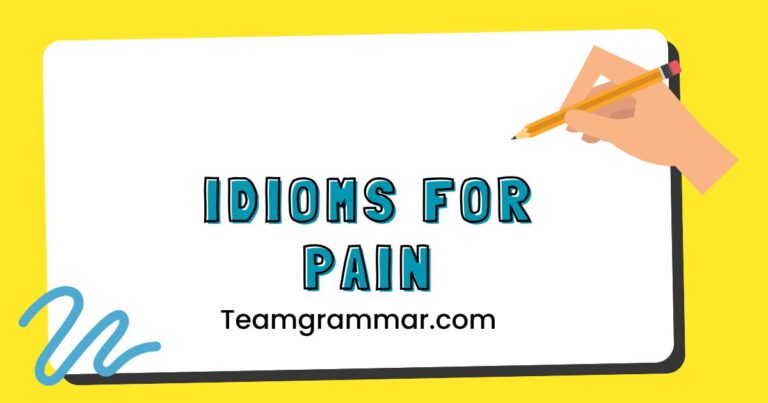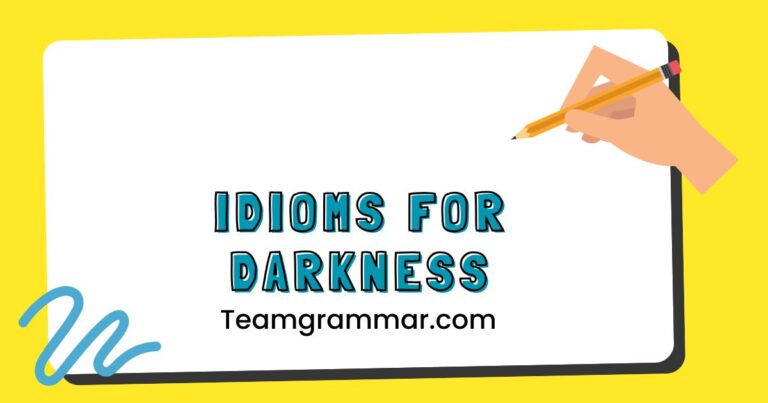31 Idioms for Addiction: Understanding Figurative Language
Understanding addiction is crucial, and the English language offers a variety of idioms that vividly describe its different aspects. These idioms often provide a more nuanced and relatable way to discuss the challenges of addiction, recovery, and related behaviors.
This article will explore common idioms related to addiction, offering definitions, examples, and usage rules to help you understand and use them effectively. This guide will benefit English language learners, writers, and anyone interested in the complexities of addiction-related language.
Table of Contents
- Introduction
- Definition of Idioms for Addiction
- Structural Breakdown of Addiction Idioms
- Types and Categories of Addiction Idioms
- Examples of Addiction Idioms
- Usage Rules for Addiction Idioms
- Common Mistakes with Addiction Idioms
- Practice Exercises
- Advanced Topics in Addiction Idioms
- FAQ
- Conclusion
Definition of Idioms for Addiction
Idiomsare expressions whose meanings cannot be understood from the literal meanings of the individual words. Instead, they carry a figurative or symbolic meaning that is culturally understood.
Idioms related to addiction are phrases that metaphorically describe the state of being addicted, the process of recovery, or the behaviors associated with substance use or compulsive habits. These idioms provide a concise and often emotionally charged way to communicate complex ideas about addiction.
These idioms can be classified based on their function. Some describe the state of being addicted (e.g., “hooked”), while others describe the process of quitting (e.g., “going cold turkey”).
Still others relate to relapse (e.g., “falling off the wagon”) or the burden of addiction (e.g., “a monkey on one’s back”). The context in which these idioms are used is crucial for understanding their intended meaning.
For example, “on the wagon” implies abstinence, while “off the wagon” implies a return to addictive behavior.
Structural Breakdown of Addiction Idioms
Addiction idioms can vary in their structural complexity. Some are simple phrases consisting of a verb and a preposition (e.g., “kick the habit”), while others are more complex sentences (e.g., “have a monkey on one’s back”).
Understanding their structure helps in using them correctly.
Many addiction idioms involve verbs that describe actions or states, such as “hooked,” “clean up,” “relapse,” or “abstain.” These verbs are often combined with prepositions or objects to create the idiomatic meaning. For instance, “hooked on” implies a strong addiction, while “clean up” means to become free from addiction.
The structure of these idioms often reflects the process of addiction, from initial involvement to struggles with recovery.
Types and Categories of Addiction Idioms
Addiction idioms can be categorized based on the aspect of addiction they describe:
- State of Addiction: Idioms describing the condition of being addicted.
- Recovery Process: Idioms related to the journey of overcoming addiction.
- Relapse: Idioms describing a return to addictive behaviors.
- Burden of Addiction: Idioms that convey the weight or consequences of addiction.
- Abstinence: Idioms referring to staying away from addictive substances or behaviors.
Idioms Describing the State of Addiction
These idioms often convey the feeling of being controlled or consumed by an addiction.
Idioms Related to the Recovery Process
These idioms focus on the efforts and challenges involved in overcoming addiction.
Idioms Describing Relapse
These idioms describe the act of returning to addictive behaviors after a period of abstinence.
Idioms Conveying the Burden of Addiction
These idioms highlight the negative consequences and weight of addiction.
Idioms Referring to Abstinence
These idioms describe the state of staying away from addictive substances or behaviors.
Examples of Addiction Idioms
Here are some common idioms related to addiction, with examples of how they are used in context.
Hooked
Hooked means being addicted or strongly attached to something.
The following table provides examples of how the idiom “hooked” is used in sentences.
| Example | Explanation |
|---|---|
| He got hooked on painkillers after his surgery. | He became addicted to painkillers. |
| She’s hooked on that new video game; she plays it for hours every day. | She’s strongly addicted to the video game. |
| The company is trying to get customers hooked on their new product. | The company wants customers to become addicted to their product. |
| I was hooked from the first episode of that TV show. | I was immediately captivated by the TV show. |
| Many teenagers are hooked on social media. | Many teenagers are addicted to social media. |
| Once he tried the drug, he was hooked instantly. | He became addicted to the drug very quickly. |
| The book was so good, I was hooked until I finished it. | The book was captivating and kept my attention. |
| She knew she was hooked when she started hiding her habit. | She realized she was addicted when she began concealing her behavior. |
| They are targeting young adults to get them hooked early. | They are trying to get young adults addicted from a young age. |
| He tried to help his friend who was hooked on gambling. | He tried to help his friend who was addicted to gambling. |
| She’s hooked on coffee and can’t start her day without it. | She is heavily reliant on coffee. |
| The program aims to help people who are hooked on various substances. | The program helps people addicted to different substances. |
| He warned his children about the dangers of getting hooked. | He cautioned his children about the risks of becoming addicted. |
| The detective was hooked on solving the mystery. | The detective was captivated and determined to solve the mystery. |
| They are trying to understand why some people get hooked so easily. | They are studying the reasons why some people become addicted quickly. |
| He felt hooked to the adrenaline rush of extreme sports. | He felt addicted to the excitement of extreme sports. |
| The city is trying to reduce the number of people hooked on opioids. | The city is working to decrease opioid addiction. |
| She realized she was hooked when she couldn’t stop thinking about it. | She knew she was addicted when she was constantly preoccupied. |
| They offer support for families dealing with loved ones who are hooked. | They provide support for families of addicted individuals. |
| He was hooked on the thrill of the chase. | He was addicted to the excitement of pursuing something. |
| Even after years of sobriety, he worried about getting hooked again. | He was concerned about relapsing into addiction. |
| The doctor explained the process of getting hooked on nicotine. | The doctor described how addiction to nicotine develops. |
| She didn’t want her children to get hooked on video games. | She wanted to prevent her children from becoming addicted to video games. |
Monkey on One’s Back
Monkey on one’s back refers to a heavy burden or problem that is difficult to get rid of, often referring to an addiction.
The following table provides examples of how the idiom “monkey on one’s back” is used in sentences.
| Example | Explanation |
|---|---|
| He finally managed to get the monkey off his back by entering rehab. | He overcame his addiction by going to rehab. |
| The debt felt like a monkey on her back, always weighing her down. | The debt was a constant burden for her. |
| After years of struggling, she finally shook the monkey off her back. | After years of struggle, she finally overcame her problem. |
| He described his addiction as a monkey on his back that he couldn’t shake. | He described his addiction as a persistent and difficult burden. |
| The pressure to succeed became a monkey on her back. | The pressure to succeed became a heavy burden for her. |
| He felt like he had a monkey on his back until he confessed his mistake. | He felt burdened by his guilt until he admitted his error. |
| She’s trying to get the monkey of debt off her back. | She is trying to eliminate her debt burden. |
| The fear of failure was a monkey on his back throughout the project. | He was constantly burdened by the fear of not succeeding. |
| He finally got the monkey of his past off his back and moved forward. | He finally overcame the burden of his past and progressed in life. |
| The responsibility of caring for his family felt like a monkey on his back. | The responsibility of caring for his family felt like a heavy burden. |
| She helped him get the monkey of addiction off his back. | She helped him overcome his addiction. |
| The constant criticism felt like a monkey on her back. | The constant criticism was a persistent burden for her. |
| He’s been trying to get the monkey of self-doubt off his back. | He has been trying to overcome his self-doubt. |
| The burden of expectations was a monkey on his back. | The expectations placed upon him weighed heavily on him. |
| She finally managed to shake the monkey of her insecurities off her back. | She finally overcame her insecurities. |
| He struggled to get the monkey of grief off his back after the loss. | He struggled to overcome the burden of grief after the loss. |
| The pressure to maintain a perfect image became a monkey on her back. | The pressure to maintain a perfect image was a constant burden. |
| He feels like he has a monkey on his back until he finishes his degree. | He feels burdened until he completes his degree. |
| She helped him get the monkey of his past mistakes off his back. | She helped him overcome the burden of his past mistakes. |
| The stress of the job was a monkey on his back. | The stress of the job was a constant burden for him. |
| Even after years, he still felt the monkey of guilt on his back. | He still felt burdened by guilt years later. |
| She is trying to get the monkey of her financial problems off her back. | She is trying to overcome her financial difficulties. |
| He’s been working hard to remove the monkey off his back. | He’s been working hard to overcome his problems. |
On the Wagon
On the wagon means abstaining from alcohol or other addictive substances.
The following table provides examples of how the idiom “on the wagon” is used in sentences.
| Example | Explanation |
|---|---|
| He’s been on the wagon for six months now. | He has been abstaining from alcohol for six months. |
| After his health scare, he decided to get on the wagon. | After his health scare, he decided to abstain from alcohol. |
| She’s on the wagon and feeling much healthier. | She is abstaining from alcohol and feeling healthier. |
| He told his friends he was on the wagon and wouldn’t be drinking at the party. | He told his friends he was abstaining from alcohol and wouldn’t drink at the party. |
| Being on the wagon has improved his focus at work. | Abstaining from alcohol has improved his focus at work. |
| She’s been on the wagon since the beginning of the year. | She has been abstaining from alcohol since January 1st. |
| He’s on the wagon to improve his overall health. | He is abstaining from alcohol to become healthier. |
| After the intervention, he committed to getting on the wagon. | After the intervention, he committed to abstaining from alcohol. |
| She decided to get on the wagon to support her friend. | She decided to abstain from alcohol to support her friend. |
| He’s been on the wagon and attending AA meetings regularly. | He has been abstaining from alcohol and attending AA meetings. |
| She said she was on the wagon, but I saw her drinking. | She claimed to be abstaining from alcohol, but I saw her drinking. |
| He’s on the wagon and feeling more energetic than ever. | He is abstaining from alcohol and feeling more energetic. |
| She decided to get on the wagon for her family. | She decided to abstain from alcohol for her family’s sake. |
| He’s on the wagon and following a strict recovery plan. | He is abstaining from alcohol and following a recovery plan. |
| She’s on the wagon and focused on her sobriety. | She is abstaining from alcohol and focused on staying sober. |
| He’s been on the wagon and is much happier now. | He has been abstaining from alcohol and is happier. |
| She’s on the wagon to prove she can do it. | She is abstaining from alcohol to show she can. |
| He’s on the wagon and working on rebuilding his life. | He is abstaining from alcohol and improving his life. |
| She’s on the wagon and committed to staying sober. | She is abstaining from alcohol and dedicated to sobriety. |
| He’s on the wagon and finally feels in control of his life. | He is abstaining from alcohol and feels in control. |
| Since getting on the wagon, he’s been a better father. | Since abstaining from alcohol, he has been a better father. |
| She is on the wagon and attends support group meetings. | She is abstaining from alcohol and attends support groups. |
| He’s on the wagon and much more present in his relationships. | He is abstaining from alcohol and more engaged in his relationships. |
Off the Wagon
Off the wagon means relapsing or returning to alcohol or other addictive substances after a period of abstinence.
The following table provides examples of how the idiom “off the wagon” is used in sentences.
| Example | Explanation |
|---|---|
| He fell off the wagon after a stressful week at work. | He relapsed and started drinking again after a stressful week. |
| She was doing so well, but then she went off the wagon. | She was abstaining successfully, but then she relapsed. |
| Going off the wagon set him back in his recovery. | Relapsing set him back in his recovery process. |
| He admitted that he had gone off the wagon and was seeking help again. | He admitted that he had relapsed and was seeking help again. |
| She was disappointed when she heard he had fallen off the wagon. | She was disappointed when she heard he had relapsed. |
| After months of sobriety, he unfortunately went off the wagon. | After months of not drinking, he unfortunately relapsed. |
| She went off the wagon due to peer pressure at the party. | She relapsed because of pressure from her friends at the party. |
| He’s trying to get back on the wagon after going off last month. | He is trying to abstain again after relapsing last month. |
| She struggled not to go off the wagon during the holidays. | She struggled not to relapse during the holiday season. |
| He felt guilty after going off the wagon and disappointing his family. | He felt guilty after relapsing and disappointing his family. |
| She worried about him going off the wagon during the difficult times. | She worried about him relapsing during the challenging moments. |
| He tried to hide that he had gone off the wagon from his support group. | He tried to conceal his relapse from his support group. |
| She helps people get back on the wagon after they go off. | She helps people abstain again after they relapse. |
| He knew the risks of going off the wagon, but he couldn’t resist. | He knew the risks of relapsing, but he couldn’t resist. |
| She warned him about the dangers of going off the wagon and losing progress. | She cautioned him about the risks of relapsing and losing progress. |
| He went off the wagon after a major life event triggered his addiction. | He relapsed after a significant event triggered his addiction. |
| She tried to prevent him from going off the wagon, but she couldn’t. | She tried to stop him from relapsing, but she wasn’t successful. |
| He’s determined to stay on the wagon this time, after going off several times before. | He is determined to abstain this time, after relapsing multiple times. |
| She supports him to get back on the wagon every time he goes off. | She supports him to abstain again each time he relapses. |
| He is ashamed that he went off the wagon in front of his children. | He is ashamed that he relapsed in front of his children. |
| She understands that going off the wagon is a part of the recovery process for some. | She understands that relapse can be a part of the recovery journey. |
| He is working hard to avoid going off the wagon again. | He is working hard to prevent another relapse. |
| She knows the triggers that might make him go off the wagon. | She knows the factors that might cause him to relapse. |
Going Cold Turkey
Going cold turkey means abruptly stopping the use of an addictive substance or behavior.
The following table provides examples of how the idiom “going cold turkey” is used in sentences.
| Example | Explanation |
|---|---|
| He decided to quit smoking and went cold turkey. | He decided to quit smoking abruptly. |
| She tried going cold turkey, but the withdrawal symptoms were too severe. | She tried quitting abruptly, but the withdrawal symptoms were too severe. |
| Going cold turkey can be dangerous without medical supervision. | Abruptly stopping the use of an addictive substance can be dangerous. |
| He attempted to quit coffee cold turkey, but the headaches were unbearable. | He tried to quit coffee abruptly, but the headaches were unbearable. |
| She went cold turkey and experienced intense cravings. | She quit abruptly and experienced intense cravings. |
| He recommends not going cold turkey without medical advice. | He advises against abruptly stopping without consulting a doctor. |
| She chose to go cold turkey to prove her willpower. | She chose to quit abruptly to demonstrate her strength. |
| Going cold turkey was the hardest thing he’s ever done. | Abruptly stopping was the most challenging thing he has ever done. |
| She supports people who are going cold turkey with their addictions. | She supports people who are abruptly quitting their addictions. |
| He decided that going cold turkey was the best approach for him. | He decided that abruptly stopping was the best method for him. |
| She found going cold turkey to be more effective than tapering off. | She found abruptly quitting to be more effective than gradually reducing. |
| He cautions against going cold turkey without a support system. | He warns against abruptly stopping without a support network. |
| She helped him through the process of going cold turkey. | She assisted him during his abrupt quitting process. |
| He knows that going cold turkey can lead to severe withdrawal. | He knows that abruptly stopping can result in severe withdrawal symptoms. |
| She advises him to consult a doctor before going cold turkey. | She suggests that he seek medical advice before abruptly quitting. |
| He went cold turkey from social media to improve his mental health. | He abruptly stopped using social media to enhance his mental well-being. |
| She attempted to quit sugar cold turkey, but it was too difficult. | She tried to abruptly stop consuming sugar, but it was too challenging. |
| He found that going cold turkey improved his sleep quality. | He found that abruptly stopping enhanced his sleep. |
| She supports him to get through the initial phase of going cold turkey. | She helps him navigate the initial stage of abruptly quitting. |
| He is determined to succeed in going cold turkey this time. | He is determined to succeed in abruptly quitting this time. |
| She celebrated his success in going cold turkey with him. | She celebrated his achievement in abruptly quitting with him. |
| He is prepared for the challenges of going cold turkey. | He is ready for the difficulties of abruptly quitting. |
| She knows the importance of patience when going cold turkey. | She acknowledges the significance of patience during abrupt quitting. |
Usage Rules for Addiction Idioms
When using addiction idioms, it’s important to consider the context and audience. While these idioms can add color and depth to your language, they should be used appropriately and with sensitivity.
Avoid using them in formal or clinical settings where precise language is necessary. Be mindful of the potential to trivialize or stigmatize addiction when using these idioms.
Ensure that the idiom fits grammatically within the sentence. For example, you would say “He is hooked on drugs,” not “He is hook on drugs.” Pay attention to the prepositions and articles that accompany the idiom.
Also, consider the connotation of the idiom. Some idioms, like “a monkey on one’s back,” carry a more negative connotation than others, like “on the wagon.” Choose idioms that accurately reflect the situation and avoid causing offense or misunderstanding.
Common Mistakes with Addiction Idioms
One common mistake is using the idioms out of context or misinterpreting their meaning. For instance, using “on the wagon” to mean someone is causing trouble is incorrect.
Another mistake is mixing up idioms or using parts of different idioms together. For example, saying “He’s got a monkey on the hook” is incorrect; it should be “He’s hooked” or “He’s got a monkey on his back.”
Another frequent error is using the literal meaning of the words instead of the idiomatic meaning. For example, if someone says, “He fell off the wagon,” it doesn’t mean they literally fell off a wagon.
It means they relapsed. Proper use of idioms requires understanding their figurative meaning and using them in the correct context.
Here are some examples of correct and incorrect usage:
| Incorrect | Correct | Explanation |
|---|---|---|
| He’s got a monkey on the hook. | He’s got a monkey on his back. | The correct idiom is “a monkey on one’s back.” |
| She’s hook on drugs. | She’s hooked on drugs. | The correct idiom is “hooked on.” |
| He went cold turkey from wagon. | He went cold turkey. | “Cold turkey” is the complete idiom and doesn’t need “from wagon.” |
| She is on a wagon. | She is on the wagon. | The correct idiom is “on the wagon.” |
Practice Exercises
Test your understanding of addiction idioms with the following exercises.
Exercise 1: Fill in the Blanks
Complete the following sentences with the appropriate idiom.
| Question | Answer |
|---|---|
| After years of addiction, he finally got the ___________ off his back. | monkey |
| She decided to go ___________ to quit smoking. | cold turkey |
| He’s been ___________ for a year now and is feeling great. | on the wagon |
| Unfortunately, he fell ___________ after a stressful event. | off the wagon |
| She’s ___________ on that new series; she watches it every night. | hooked |
| He’s trying to get ___________ of debt off his back. | the monkey |
| They warned him about ___________ without support. | going cold turkey |
| She’s been ___________ since her intervention. | on the wagon |
| He’s ashamed he went ___________ in front of his family. | off the wagon |
| She realized she was ___________ after the first episode. | hooked |
Exercise 2: Multiple Choice
Choose the correct meaning of the idiom in each sentence.
| Question | Options | Answer |
|---|---|---|
| He finally managed to get the monkey off his back. | a) Overcame a burden b) Acquired a pet c) Climbed a tree | a) Overcame a burden |
| She decided to go cold turkey to quit her habit. | a) Eat a cold meal b) Quit abruptly c) Get a cold | b) Quit abruptly |
| He’s been on the wagon for six months. | a) Driving a wagon b) Abstaining from alcohol c) Traveling | b) Abstaining from alcohol |
| She fell off the wagon last week. | a) Had an accident b) Relapsed c) Went for a ride | b) Relapsed |
| He’s hooked on that video game. | a) Attached to a hook b) Addicted to the game c) Playing a game with hooks | b) Addicted to the game |
| She’s trying to shake the monkey of self doubt off her back. | a) Literally removing a monkey b) Overcoming self-doubt c) Training a monkey | b) Overcoming self-doubt |
| He’s on the wagon to improve his overall health. | a) Building a wagon b) Riding a wagon c) Abstaining from alcohol | c) Abstaining from alcohol |
| After months of sobriety, he unfortunately went off the wagon. | a) Driving a wagon off course b) Relapsing c) Selling a wagon | b) Relapsing |
| She supports people who are going cold turkey with their addictions. | a) Giving them cold turkey to eat b) Abruptly quitting c) Ignoring their addictions | b) Abruptly quitting |
| He realized she was hooked after the first episode. | a) Fishing b) Captivated c) Angry | b) Captivated |
Advanced Topics in Addiction Idioms
For advanced learners, it can be helpful to explore the origins and cultural context of these idioms. Many of these idioms have historical roots that shed light on their meanings.
For example, the term “on the wagon” is believed to have originated in the 19th century when people would transport water in wagons during temperance movement rallies. Similarly, understanding the metaphorical nature of “a monkey on one’s back” can help appreciate the burden and difficulty of addiction.
Additionally, analyzing how these idioms are used in literature, film, and other forms of media can provide a deeper understanding of their nuances and impact. Advanced learners can also explore regional variations and adaptations of these idioms.
For example, different cultures may have their own unique idioms for describing addiction and recovery. Comparing and contrasting these idioms can offer insights into different cultural perspectives
on addiction.
FAQ
Q: Why are idioms important in understanding addiction?
A: Idioms provide a nuanced and relatable way to discuss the complexities of addiction, making it easier to communicate about sensitive topics.
Q: Can idioms be used in formal writing about addiction?
A: It’s generally best to avoid idioms in formal or clinical settings where precise language is necessary.
Q: What should I do if I’m unsure about the meaning of an idiom?
A: Look it up in a dictionary or idiom dictionary, or ask a native English speaker for clarification.
Q: How can I avoid misusing addiction idioms?
A: Pay attention to the context and connotation of the idiom, and ensure it fits grammatically within the sentence.
Q: Are there regional variations in addiction idioms?
A: Yes, different cultures and regions may have their own unique idioms for describing addiction and recovery.
Conclusion
Understanding idioms related to addiction can greatly enhance your comprehension of English and improve your ability to discuss this complex issue with sensitivity and nuance. By learning the definitions, usage rules, and common mistakes associated with these idioms, you can communicate more effectively and avoid misunderstandings.
Whether you are an English language learner, a writer, or simply someone interested in the language of addiction, mastering these idioms will prove invaluable.







